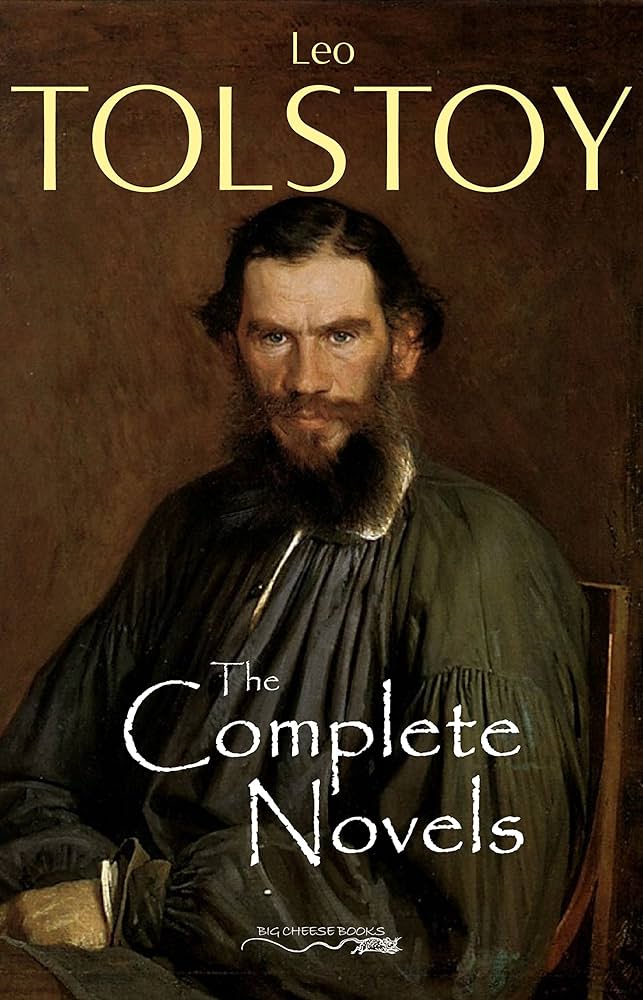Leo Tolstoy Books: A Comprehensive Guide to the Life and Works of a Literary Giant

Leo Tolstoy, a towering figure in Russian and world literature, left an indelible mark on the literary landscape with his profound explorations of the human condition, morality, and the complexities of life. His epic novels, short stories, plays, and essays continue to captivate readers and inspire critical analysis generations after their creation. This comprehensive guide delves into the world of Leo Tolstoy’s books, exploring their genres, themes, cultural impact, and lasting legacy.
Exploring the Genres and Themes of Leo Tolstoy’s Works
Tolstoy’s literary output spans several genres, showcasing his versatility and intellectual depth. He is primarily known for his monumental novels, which are hallmarks of realism and psychological depth. However, his shorter works, including short stories and novellas, offer equally compelling insights into human nature and societal issues. His plays delve into moral dilemmas and societal hypocrisy, while his essays reflect his evolving philosophical and spiritual perspectives. He tackled diverse subjects, ranging from the epic sweep of history in War and Peace to the intimate exploration of death and meaning in The Death of Ivan Ilyich. His writing often serves as a powerful social commentary, addressing topics such as social injustice, class conflict, faith, and the devastating impact of war.

Realism and Psychological Depth: A Defining Characteristic
Tolstoy’s mastery of realism is evident in his meticulous portrayal of characters and settings. He meticulously details the lives of his protagonists, showing the nuances of their inner lives and motivations. This realism, however, is not merely descriptive. Tolstoy uses it to explore the complex psychological landscapes of his characters, delving into their emotions, anxieties, and moral struggles. His characters are not idealized heroes but flawed individuals grappling with universal experiences of love, loss, ambition, and despair. This psychological depth is what makes his characters so compelling and enduringly relatable, transcending cultural and historical boundaries.
Social Commentary: Reflecting the Realities of 19th-Century Russia

Tolstoy’s novels are not confined to the personal struggles of his characters. They function as insightful social commentaries, reflecting the socio-political realities of 19th-century Russia. He vividly portrays the stark contrast between the aristocratic elite and the peasantry, highlighting the inequalities and injustices prevalent in Russian society. The impact of war, both on individuals and on the broader societal fabric, is also a recurring theme, particularly in War and Peace, which offers a devastating critique of the Napoleonic Wars and their human cost.
Spiritual and Philosophical Explorations: A Journey of Self-Discovery
Tolstoy’s later works reflect a profound spiritual and philosophical transformation. After a period of profound existential questioning, he embraced a form of Christian anarchism, which deeply influenced his writing. This spiritual awakening is evident in his exploration of faith, morality, and the search for meaning. Works such as A Confession and The Kingdom of God Is Within You reflect this shift, demonstrating his commitment to nonviolent resistance and social reform. His ideas on non-violent resistance would later profoundly influence such figures as Mahatma Gandhi and Martin Luther King Jr., demonstrating the far-reaching impact of his philosophical insights.
Leo Tolstoy’s Greatest Books: A Closer Look at Key Works

While all of Tolstoy’s works deserve attention, certain novels stand out as particularly significant contributions to literature. These enduring masterpieces showcase his genius and continue to captivate readers worldwide.
1. War and Peace: An Epic of History and Humanity
War and Peace is a sprawling masterpiece, often cited as one of the greatest novels ever written. It is not simply a historical narrative but a multi-layered exploration of human experience against the backdrop of Napoleon’s invasion of Russia in 1812. Tolstoy masterfully intertwines the lives of several aristocratic families, revealing their individual struggles and their collective responses to the upheavals of war and societal change. The novel delves into profound philosophical questions concerning free will, determinism, the meaning of life, and the interconnectedness of individual destinies within the larger currents of history.
The sheer scope of War and Peace is breathtaking. The novel features a vast cast of characters, each with their own complex motivations and storylines. Tolstoy’s attention to detail is meticulous, creating a richly textured portrayal of Russian society during a pivotal moment in history. He skillfully blends realistic depictions of everyday life with dramatic portrayals of major historical events. He also integrates philosophical digressions and introspective moments that provide insights into his own evolving worldview. The emotional depth and philosophical complexity make War and Peace a work of unparalleled depth and richness.
2. Anna Karenina: A Timeless Exploration of Love and Society
Anna Karenina, another of Tolstoy’s most celebrated novels, offers a powerful exploration of love, adultery, and societal expectations. Anna, a beautiful and passionate woman, finds herself trapped in a loveless marriage and embarks on a passionate affair, challenging the rigid social norms of 19th-century Russia. The novel examines the consequences of her actions, highlighting the societal pressures and personal sacrifices that shape her destiny.
Running parallel to Anna’s story is that of Levin, a landowner who grapples with questions of faith, family, and rural life. The contrasting narratives of Anna and Levin provide a complex and multi-faceted view of human experience and societal values. Tolstoy’s understanding of human psychology is again on full display, offering insights into the motives and inner conflicts of his characters. The novel’s exploration of universal themes of love, betrayal, societal constraints, and personal fulfillment ensures its continuing relevance for contemporary readers.
3. The Death of Ivan Ilyich: A Confrontation with Mortality
The Death of Ivan Ilyich is a novella that delves into the profound experience of death and the search for meaning in the face of mortality. Ivan Ilyich, a high-court judge, faces a terminal illness that forces him to confront the emptiness of his materialistic and superficial life. As his death approaches, he grapples with existential questions about the meaning of his existence and the nature of his relationships.
Tolstoy’s masterful use of psychological realism allows readers to witness Ivan Ilyich’s internal transformation as he grapples with his impending demise. The novella is not a celebration of death but a poignant exploration of life’s fragility and the urgency of finding purpose. Tolstoy’s keen observation of human nature is evident in the ways Ivan Ilyich’s relationships with family, friends, and colleagues change in light of his illness. The narrative serves as a potent reminder of life’s fleeting nature and the importance of living authentically.
4. The Kreutzer Sonata: A Study of Jealousy and Obsession
The Kreutzer Sonata is a novella that explores the destructive nature of jealousy, obsession, and sexual repression. The narrative unfolds through the confession of a man who murdered his wife, driven by intense jealousy and suspicion of infidelity.
The novella is a stark and unsettling exploration of the dark side of human nature. Tolstoy dissects the complex interplay of societal expectations, sexual frustration, and marital discord that led to the protagonist’s violent act. He uses the narrative to offer a critique of the societal structures and moral values that contribute to marital conflict. While controversial in its views, the novella continues to stir debate and provoke reflection.
Cultural Impact and Literary Influence
Tolstoy’s influence extends far beyond the pages of his novels. His literary innovations, psychological depth, and social commentary have profoundly impacted generations of writers.
Literary Innovation: Shaping the Course of Realism
Tolstoy’s novels are considered groundbreaking works of literary realism, notably for their scale and scope. His ability to create complex and multifaceted characters, intricately plotted narratives, and richly detailed descriptions significantly influenced the development of realism in literature. His unconventional narrative techniques, such as incorporating philosophical digressions and shifting viewpoints, further expanded the possibilities of novelistic form. His work remains a cornerstone of realist fiction and continues to inspire writers to explore the complexities of human experience.
Psychological Depth: Unparalleled Insights into the Human Mind
Tolstoy’s unique insight into the human psyche is unparalleled. He delves into the inner lives of his characters with unparalleled depth and sensitivity. His exploration of their motivations, desires, and fears reveals the complexities of human psychology with remarkable accuracy. This focus on inner life is a hallmark of his work and has had a profound influence on subsequent writers interested in psychological realism and character study.
Social Commentary: Addressing Pressing Social Issues
Tolstoy’s novels often serve as powerful social commentaries. He uses his writing to address the critical social issues of his time, such as class inequality, the dehumanizing effects of war, and the hypocrisies of societal norms. His social critiques, presented with great subtlety and emotional impact, have continued to resonate with readers who recognize the enduring relevance of these issues. His works have been instrumental in prompting discussions of social justice and societal reform.
Enduring Themes: Universal Relevance Across Cultures and Time
Tolstoy’s works explore universal themes that transcend cultural and historical boundaries. The explorations of love, loss, war, faith, and the search for meaning are timeless and resonate deeply with readers from diverse backgrounds. These enduring themes ensure that Tolstoy’s works remain relevant and engaging for readers across generations, prompting readers to question their own experiences and their place in the world.
Captivating Readers: The Power of Tolstoy’s Prose
Tolstoy’s writing style is both powerful and evocative. His ability to capture the nuances of human emotion and create memorable characters guarantees continued engagement. The richness of his descriptions and the emotional impact of his storytelling contribute significantly to his enduring appeal.
Cultural Significance: Worldwide Impact and Adaptations
Tolstoy’s novels have been translated into countless languages, demonstrating their global appeal. These works have had a significant impact on cultures worldwide, shaping literary tastes, inspiring philosophical discussions, and influencing artistic expression. The numerous adaptations for film, theater, and opera further attest to the cultural impact of his works, proving their ability to transcend the written word and inspire diverse creative interpretations.
Communities and Adaptations: A Living Legacy
The enduring appeal of Leo Tolstoy’s works is reflected in the vibrant communities that have formed around his novels. These communities foster discussions, analyses, and diverse interpretations of his books. Furthermore, countless adaptations in film, theater, and other media forms demonstrate the lasting power of Tolstoy’s narrative and his complex characters, continually bringing his stories to new audiences and fostering continued engagement with his themes. His work continues to be studied, debated, and reinterpreted.
In conclusion, Leo Tolstoy’s literary legacy is undeniable. His books represent a monumental contribution to world literature, continuing to impact and inspire readers and artists alike. His exploration of the human condition remains deeply relevant and his masterful storytelling will continue to captivate audiences for generations to come. His profound insights into human nature, the complexities of social structures, and the search for meaning guarantee his place as one of history’s most influential and important authors.